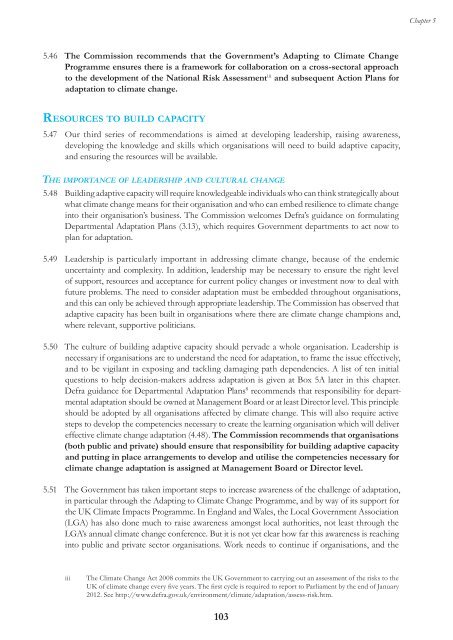Twenty-eighth Report Adapting Institutions to Climate Change Cm ...
Twenty-eighth Report Adapting Institutions to Climate Change Cm ...
Twenty-eighth Report Adapting Institutions to Climate Change Cm ...
Create successful ePaper yourself
Turn your PDF publications into a flip-book with our unique Google optimized e-Paper software.
5.46<br />
The Commission recommends that the Government’s <strong>Adapting</strong> <strong>to</strong> <strong>Climate</strong> <strong>Change</strong><br />
Programme ensures there is a framework for collaboration on a cross-sec<strong>to</strong>ral approach<br />
<strong>to</strong> the development of the National Risk Assessmentiii and subsequent Action Plans for<br />
adaptation <strong>to</strong> climate change.<br />
RESOURCES TO BUILD CAPACITY<br />
5.47<br />
Our third series of recommendations is aimed at developing leadership, raising awareness,<br />
developing the knowledge and skills which organisations will need <strong>to</strong> build adaptive capacity,<br />
and ensuring the resources will be available.<br />
THE IMPORTANCE OF LEADERSHIP AND CULTURAL CHANGE<br />
5.48 Building adaptive capacity will require knowledgeable individuals who can think strategically about<br />
what climate change means for their organisation and who can embed resilience <strong>to</strong> climate change<br />
in<strong>to</strong> their organisation’s business. The Commission welcomes Defra’s guidance on formulating<br />
Departmental Adaptation Plans (3.13), which requires Government departments <strong>to</strong> act now <strong>to</strong><br />
plan for adaptation.<br />
5.49<br />
5.50<br />
5.51<br />
Leadership is particularly important in addressing climate change, because of the endemic<br />
uncertainty and complexity. In addition, leadership may be necessary <strong>to</strong> ensure the right level<br />
of support, resources and acceptance for current policy changes or investment now <strong>to</strong> deal with<br />
future problems. The need <strong>to</strong> consider adaptation must be embedded throughout organisations,<br />
and this can only be achieved through appropriate leadership. The Commission has observed that<br />
adaptive capacity has been built in organisations where there are climate change champions and,<br />
where relevant, supportive politicians.<br />
The culture of building adaptive capacity should pervade a whole organisation. Leadership is<br />
necessary if organisations are <strong>to</strong> understand the need for adaptation, <strong>to</strong> frame the issue effectively,<br />
and <strong>to</strong> be vigilant in exposing and tackling damaging path dependencies. A list of ten initial<br />
questions <strong>to</strong> help decision-makers address adaptation is given at Box 5A later in this chapter.<br />
Defra guidance for Departmental Adaptation Plans8 recommends that responsibility for departmental<br />
adaptation should be owned at Management Board or at least Direc<strong>to</strong>r level. This principle<br />
should be adopted by all organisations affected by climate change. This will also require active<br />
steps <strong>to</strong> develop the competencies necessary <strong>to</strong> create the learning organisation which will deliver<br />
effective climate change adaptation (4.48). The Commission recommends that organisations<br />
(both public and private) should ensure that responsibility for building adaptive capacity<br />
and putting in place arrangements <strong>to</strong> develop and utilise the competencies necessary for<br />
climate change adaptation is assigned at Management Board or Direc<strong>to</strong>r level.<br />
The Government has taken important steps <strong>to</strong> increase awareness of the challenge of adaptation,<br />
in particular through the <strong>Adapting</strong> <strong>to</strong> <strong>Climate</strong> <strong>Change</strong> Programme, and by way of its support for<br />
the UK <strong>Climate</strong> Impacts Programme. In England and Wales, the Local Government Association<br />
(LGA) has also done much <strong>to</strong> raise awareness amongst local authorities, not least through the<br />
LGA’s annual climate change conference. But it is not yet clear how far this awareness is reaching<br />
in<strong>to</strong> public and private sec<strong>to</strong>r organisations. Work needs <strong>to</strong> continue if organisations, and the<br />
iii The <strong>Climate</strong> <strong>Change</strong> Act 2008 commits the UK Government <strong>to</strong> carrying out an assessment of the risks <strong>to</strong> the<br />
UK of climate change every five years. The first cycle is required <strong>to</strong> report <strong>to</strong> Parliament by the end of January<br />
2012. See http://www.defra.gov.uk/environment/climate/adaptation/assess-risk.htm.<br />
103<br />
Chapter 5
















